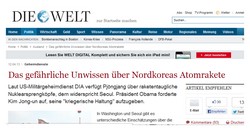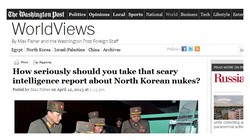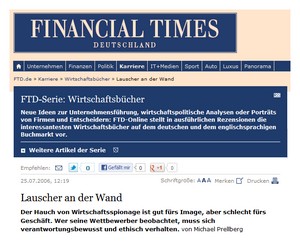 In den letzten Tagen kam ein wenig Verwirrung über die US-amerikanische Einschätzung des Atomwaffenpotenzials der Nordkoreaner auf, nachdem ein amerikanischer Kongressabgeordneter aus einem geheimen Report der DIA zitiert hatte, einem der militärischen Nachrichtendienste der USA. Dort hieß es laut Welt Online angeblich, dass „Nordkorea eine solche Waffe [eine ballistische Rakete mit einem Atomsprengkopf] abfeuern könnte, diese aber noch unzuverlässig sei“.
In den letzten Tagen kam ein wenig Verwirrung über die US-amerikanische Einschätzung des Atomwaffenpotenzials der Nordkoreaner auf, nachdem ein amerikanischer Kongressabgeordneter aus einem geheimen Report der DIA zitiert hatte, einem der militärischen Nachrichtendienste der USA. Dort hieß es laut Welt Online angeblich, dass „Nordkorea eine solche Waffe [eine ballistische Rakete mit einem Atomsprengkopf] abfeuern könnte, diese aber noch unzuverlässig sei“.
Leider hat dieser Satz die klassische Karriere einer Meldung aus dem nachrichtendienstlichen Umfeld hinter sich. Denn erstens wurde das Originalzitat aus dem Zusammenhang gerissen – wenn ein Politiker einen einzigen Satz aus einem ansonsten als „Geheim“ eingestuften Bericht erwähnt, ist das für sich genommen schon schwierig. Zweitens werden in diesem einen Satz definierte Fachbegriffe genutzt, deren Definitionen einem Laien als solche nicht bekannt sind – sie werden nicht einmal als Fachbegriffe erkannt. Drittens wird der Satz, der schon per se nicht richtig verstanden wurde, dann auch noch als Beweis für „Uneinigkeit“ verschiedener US-Geheimdienste interpretiert. Und viertens wird er journalistisch verkürzt und zugespitzt, damit’s auch mit der Überschrift klappt. Am Ende titelt die WELT Online: „Das gefährliche Unwissen über Nordkoreas Atomrakete“ und leitet den Artikel ein mit dem Satz „Laut US-Militärgeheimdienst DIA verfügt Pjöngjang über raketentaugliche Nuklearsprengköpfe“.
Dan kenswerterweise hat Max Fisher in der Washington Post den Satz wieder in den richtigen Kontext gerückt und dabei in einem lesenswerten Artikel akribisch aufgedröselt. Im Original lautet er: „D.I.A. assesses with moderate confidence the North currently has nuclear weapons capable of delivery by ballistic missiles; however the reliability will be low“ – und sagt nichts darüber aus, ob sich die fehlende Verlässlichkeit auf die Rakete oder den Sprengkopf bezieht, und schon gar nichts darüber, ob diese Vermutung eine Veränderung gegenüber der Vergangenheit darstellt. Bereits vor etwa acht Jahren wurde ein ähnlicher Satz als Einschätzung bekannt – ohne dass er in der Zwischenzeit verifiziert werden konnte. Außerdem wird diese Einschätzung offenbar nicht in der gesamten intelligence community geteilt, was die Distanzierung durch den US-Außenminister und auch durch das Pentagon erklären kann. Möglicherweise will man aber auch einer Fehlinterpretation zuvorkommen.
kenswerterweise hat Max Fisher in der Washington Post den Satz wieder in den richtigen Kontext gerückt und dabei in einem lesenswerten Artikel akribisch aufgedröselt. Im Original lautet er: „D.I.A. assesses with moderate confidence the North currently has nuclear weapons capable of delivery by ballistic missiles; however the reliability will be low“ – und sagt nichts darüber aus, ob sich die fehlende Verlässlichkeit auf die Rakete oder den Sprengkopf bezieht, und schon gar nichts darüber, ob diese Vermutung eine Veränderung gegenüber der Vergangenheit darstellt. Bereits vor etwa acht Jahren wurde ein ähnlicher Satz als Einschätzung bekannt – ohne dass er in der Zwischenzeit verifiziert werden konnte. Außerdem wird diese Einschätzung offenbar nicht in der gesamten intelligence community geteilt, was die Distanzierung durch den US-Außenminister und auch durch das Pentagon erklären kann. Möglicherweise will man aber auch einer Fehlinterpretation zuvorkommen.
HIlfreich ist es in diesem Zusammenhang auch, sich bewusst zu machen, dass „moderate confidence“ mitnichten so dahingeschrieben ist, sondern Teil einer Nomenklatur ist, die es dem ausgewählten Zielpublikum von intelligence reports ermöglichen soll, den Grad der Sicherheit einer Aussage zu bestimmen. Wer Spaß daran hat, in die Materie einzusteigen, kann dies anhand eines Essays von Sherman Kent tun, der unter dem Titel Words of Estimative Probability nicht nur die linguistischen, sondern auch die soziologischen und psychologischen Probleme auffächert, die sich ergeben, wenn man versucht, einen in Entstehung befindlichen Pudding (sprich: eine aus verschiedenen, unterschiedlich zu bewertenden Quellen zusammengesetzte Einschätzung zukünftigen Verhaltens auf Geheimhaltung ausgerichteter Akteure) so an die Wand zu nageln, dass er als Zielscheibe konkreten politischen Handelns dienen kann.






